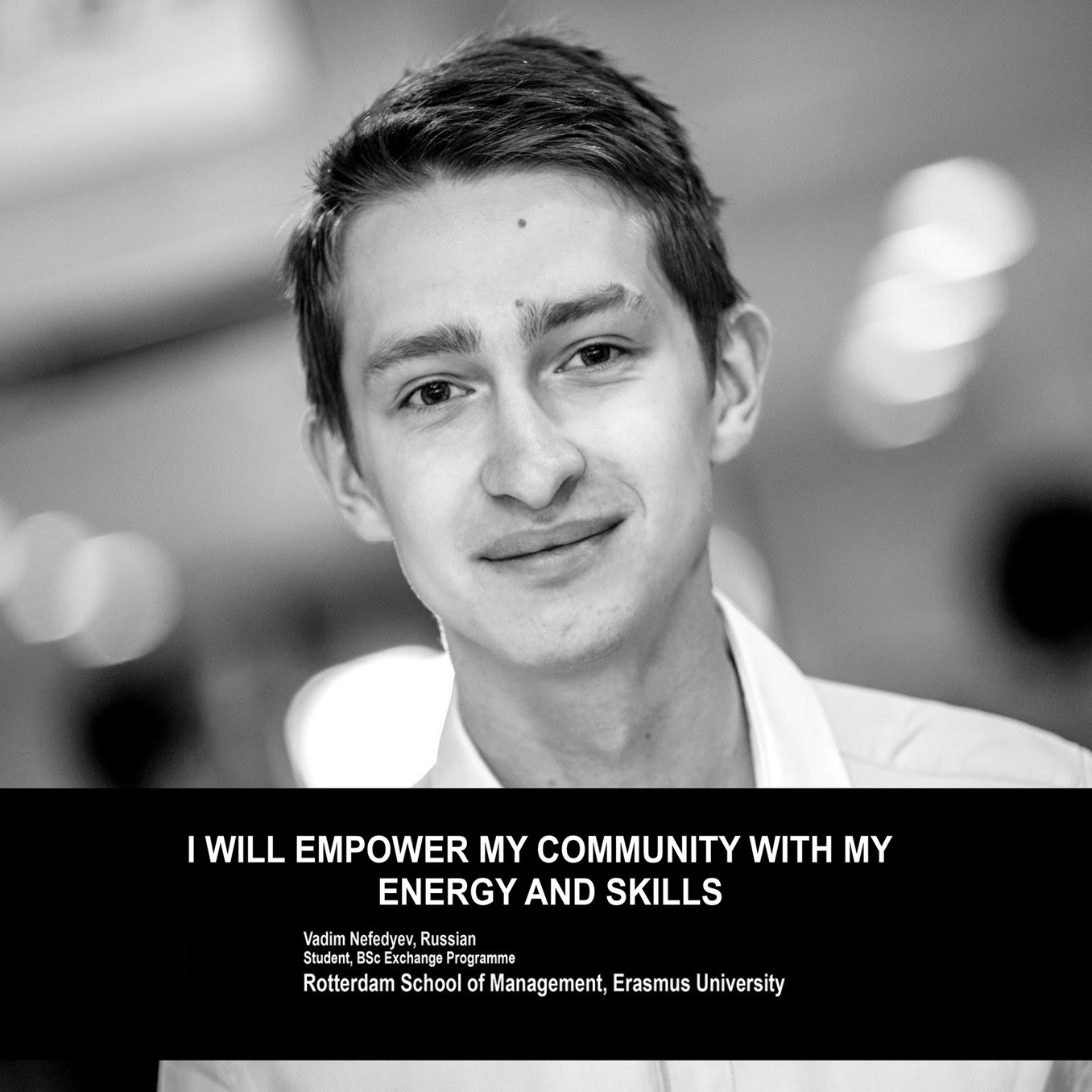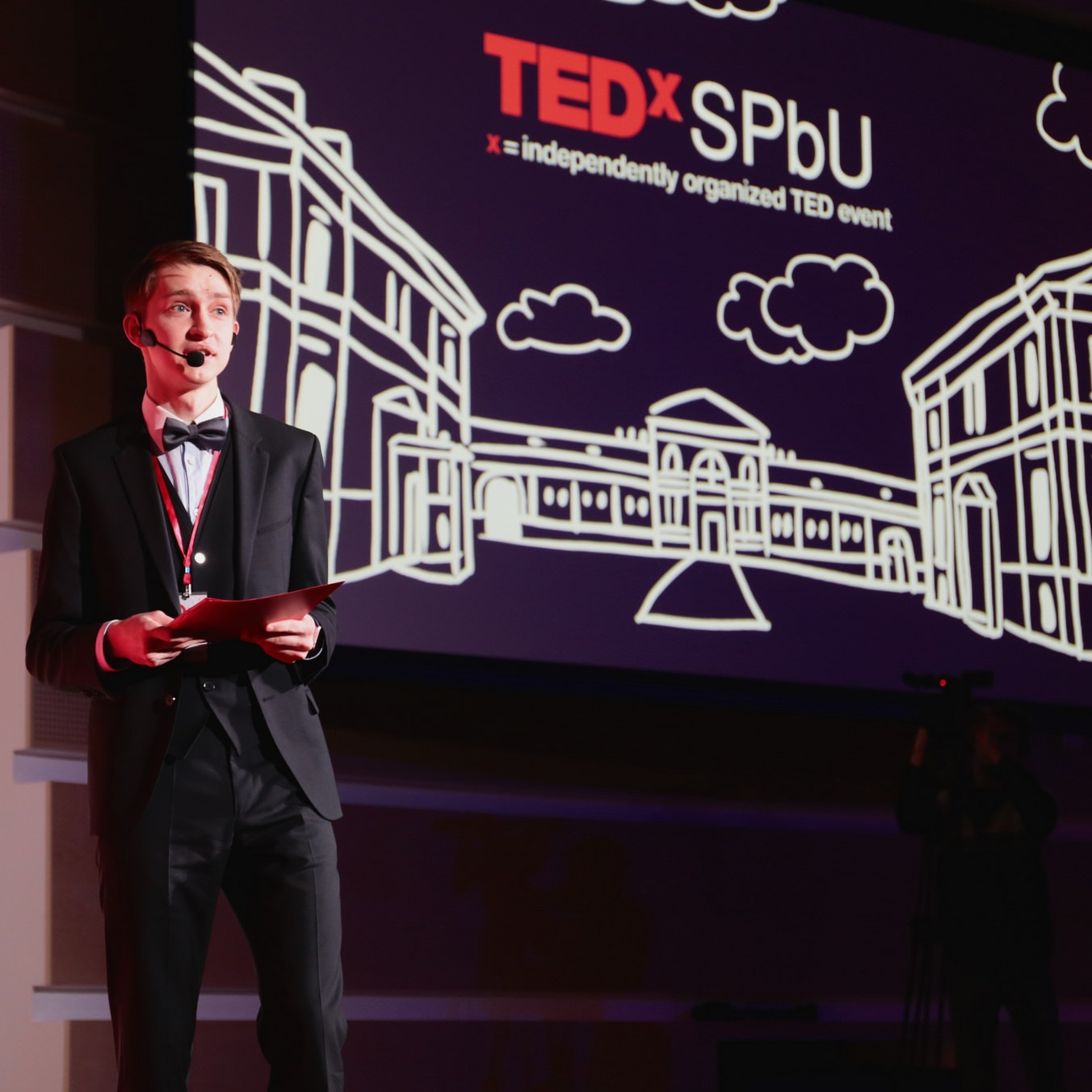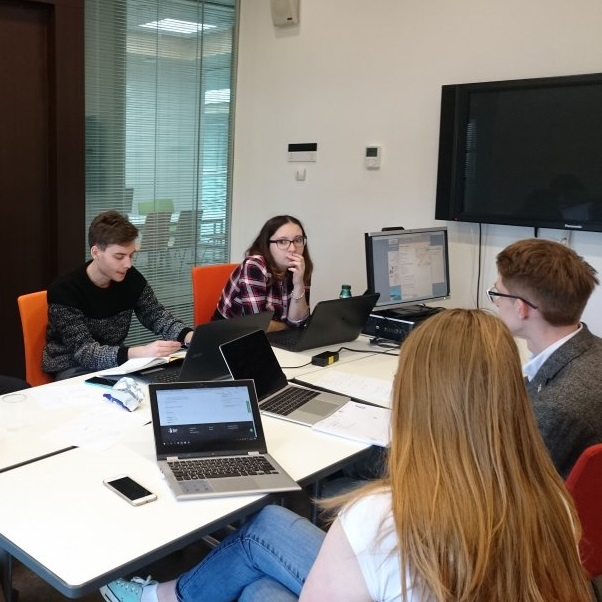17 May 2017
|
It was a snowy February evening, when a tall young man with bright eyes entered the door of the GSOM SPbU Public Relations Department. It was third-year student of the Bachelor program, Vadim Nefediev, who came to present the idea to organize a TEDx conference on the Mikhailovskaya Dacha campus. There was not so much time and plenty of things to be done, but, in the end, the conference took place. Finally on April 22, 2017, GSOM SPbU hosted its first TEDxSPbU conference, organized by the students.
We have decided to talk to Vadim so that we can share more about the idea of the event, the period of preparation, the difficulties and successes, and what he learned, as well as what he is planning next. |
|
Vadim, as far as I know, the idea of TEDx conference came to you after an exchange semester at Rotterdam School of Management in the Netherlands. Could you tell us more about that experience?
During my three months of studying at RSM, I visited two TEDx (TEDx is a TED conference organized by the local community under a license) conferences in the University and one conference organized by the city. After that, I understood that I would definitely organize an event at GSOM SPbU when I returned. I had experience in managing the GSOM Open Case Competition in 2016, but I wanted to hold an event that would be not about business. I decided to introduce the popular and well-known TED format to my home university, gathering all the departments and institutes of St. Petersburg University together on the GSOM SPbU Mikhailovskaya Dacha campus. That was the beginning of the first TEDx at both the oldest university of Russia and at the number one business school in Eastern Europe.
|
The features that attracted me to the TED conferences format were short presentations of current ideas by an incredibly varied range of speakers – everyone could speak: as a scientist or as a blogger. Having visited TEDx, I was able to experience this special spirit and observe the approach to its management. It is obvious that TEDx is often held in theaters: it is actually more a well-rehearsed and beautiful presentation than it is a conference, and in TEDxSPbU we paid special attention to the hall decoration and speakers’ rehearsals. One more fact: at RSM, the conference was managed by MBA students, but in my team there were first-year bachelor students, who often have less experience in organizing events. But I can conclude that we dealt with it and managed to achieve the important level of quality.
Thanks to my exchange semester at RSM and the experience that I got there, I was self-confident enough to launch the first TEDx conference at GSOM SPbU. |
 |
![]()
Could you tell about the experience that you got in RSM? What features in the approach to learning can you mention from this business school?
The education at Rotterdam School of Management inspired me to repeat their success in student projects. First of all I studied scrupulously the activity of STAR (the organization which mentors all student projects) in order to create a similar atmosphere and infrastructure. In my opinion GSOM SPbU students are generally excellent at event management. We know how to make big annual events. But we should remember that also small, but regular events like the Case Club or GSOM Charity (a charity organization of GSOM SPbU students) also offer highly valuable student experience. And this was, more students will have the opportunity to get exactly the in of hands-on leadership experience, which is very necessary for a successful career.
| GSOM SPbU students are excellent in event management. We know how to make big annual events. |
In the Netherlands special attention is paid to the positive impact of projects to Society and to the future. The halls of RSM are full of portraits. But these are not portraits of famous scientists and businessmen, but rather regular students that have made interesting and socially important activities and ambitious aims. At RSM I found big a family – community that study together and at the same time, think about better future. I really liked it.
As soon as I came home I began to work in the GSOM Case Club, on charity projects and TEDx. I built three teams and we began to work. Almost all my colleagues in RSM took part in some form of student project, and at GSOM SPbU I worked to create a comfortable infrastructure and atmosphere for attracting bachelor students to participate in such projects.
Compared with other St. Petersburg universities, GSOM SPbU student life is very active, but compared to RSM, the potential for growth is still enormous. |
![]()

![]()
So, inspired by the incredibly active student life, you started preparing for TEDxSPbU. Tell, please, about the structure and organization of working process. What have happened from the idea to the realization?
In the beginning we collected all the documents necessary to receive a license for TEDx during four months. I was still in the Netherlands, but in rumors about the upcoming event began to spread in GSOM SPbU. From abroad, I was able to find the first team members ready to work on this new project.
Inspired by ideas read in the Harvard Business Review, we started building a dream team. I know many leaders who write detailed instructions and control the implementation of the tasks. I decided to teach my team to “swim” by just encouraging them to jump into the water”. So I never wrote instructions, only descriptions of the tasks that needed to be done. The team chose their strategy by themselves. In two months, my management system began to work.
We conducted a TEDx with a very small budget. Food, drinks, light, printing, souvenirs – almost everything we got for free or at cost. Holding events without money is an interesting experience that allows focusing on the main thing and using imagination. So we prepared a self-made photo zone with flowers and decorative installation. And we understood from practice how to communicate with companies and sell them our idea.
Our TEDx team was the first among GSOM SPbU students who used project management service instead of chats and online tabs due to automate planning. We reduced the number of face-to-face working meetings to a minimum and they lasted no more than an hour. As I mentioned above, the team members were mostly first-year bachelor students, so it was a big challenge for all of us.
![]()
 |
What was easy to deal with and what kind of difficulties have you faced to?
It was easy and pleasant to work with the GSOM SPbU staff. During months of preparation we communicated with many different people, but were consistently met by unsurpassed understanding and support. The School helped us with resources without which the conference could not exist. It seems to me that this is why students from all over the city like to visit our GSOM SPbU campuses for TEDx, Case Club or other projects.
The success of such conference depends on the speeches of the speakers, and not on the “decorations” (marketing, design, and catering). We spent a lot of time to work with them: careful selection, rehearsals with the coach, discussion of theses and the format. I cannot say that it was difficult, but we spent a lot of energy on the speakers. I hope that the audience felt it. |
![]()
I would like to ask about the leadership. What tasks did you set for yourself as a project leader?
I had two big tasks: to teach students who had never had the experience of organizing large events, and delegate as much as possible to the team. We even set the main goal of the project for the development of everyone in the team, and only after that came the creation of the amazing event and unification of the SPbU departments and institutes.
|
It was a real challenge, because often even I did not know how to solve a specific problem better. For the team it was a matter of constant growth and stepping out of one’s comfort zone. But through this experience they learned a lot and gained confidence in their abilities. Before TEDx, the team conducted independently (without me) a Public Speaking competition, where they listened to the ideas of SPbU students and then chose one student to be the speaker the TEDx conference. After that, we were not so nervous about the first TEDx.
My next task was to let the team work without me, provide freedom and be just a mentor. Firstly, sometimes the team is better at something. Secondly, the team can do more when the processes are not tied to one person. Finally, team members gain more experience and can then conduct a TEDx or another project by themselves. Often projects ended with the departure of its leader, but at least two student projects at GSOM SPbU have managed to create a succession system, something that I also wanted to achieve with TEDxSPbU. |
We even set the main goal of the project for the development of everyone in the team, and only after that came the creation of the amazing event and unification of the SPbU departments and institutes. | |
![]()
|
So, the first TEDxSPbU conference in the first university of the Russia and in the №1 business school in Eastern Europe was held. What do you plan next?
I hope that the TEDx conference at our School will be annual, as well as the preliminary selection of the best ideas of students. The students can prepare in advance to present their thoughts in the TED format. I think this is important for the continual development of a friendly student community. The next conference will be held with another leader, and students can already join a new team.
As for me in the coming year of my graduation, I want to pursue my career, so the team of GSOM SPbU Case Club and I are going to start a new activity – student consulting. With the project GSOM Charity, we are continuing the tutoring program in orphanages and lectures in schools. This is an activity that gives me pleasure and where I can contribute and apply something new. |
 |
![]()
Vadim, are there any tips and life hacks that you could share with the students?
I have two important ideas that I want to convey to GSOM SPbU students. Firstly, student projects are worth doing, because this is the best way to gain leadership experience, take responsibility, learn how to handle with stress and work in a team. To my mind no internship at the corporation will provide such a set of soft skills. It is like launching a startup company, creating a product from scratch or building an office. Students will communicate with companies at the same level, significantly expand their network of contacts, and educate themselves to be a leader.
| Student projects are worth doing, because this is the best way to gain leadership experience, take responsibility, learn how to handle with stress and work in a team. |
The second is devoted to the issue of time management. We never have enough time for all our ambitious projects and ideas. Detailed planning, changing the activity and a team are those things that helped me to save time. How does it work? If you measure all your time, you can always identify when you lose time and find “empty slots”. Tasks for extracurricular projects can be scheduled in those “empty slots”. When I work at one task too long, my motivation and productivity dropped, so I constantly alternate activities: build models, write blog, draw with children, ride a bicycle, travel... In a team competent delegation helps you to find free time. If the total result of the project depends on you, serious work cannot be avoided. But you can split tasks or delegate something to the team.
With a reliable team and good planning, you can cope with a large project, and even save time for rest and sleep.
It seems to me that the time spent at university is a period for experiments, and now we can and should try different jobs, test ourselves and accumulate experience. Fortunately, in our School there are plenty of opportunities for students to get involved, and finally to discover themselves. |
![]()
Kseniia Karpova talked to Vadim
При использовании данного сайта Вы подтверждаете свое согласие на использование ВШМ СПбГУ cookie файлов. С подробной информацией Вы можете ознакомиться, перейдя по ссылке.